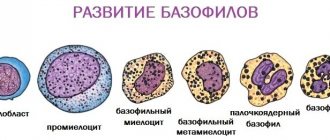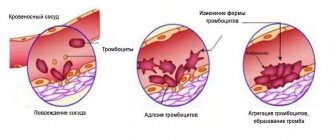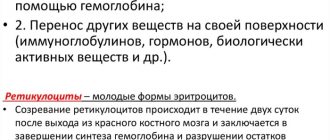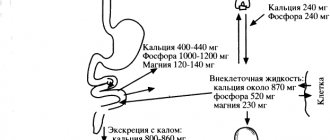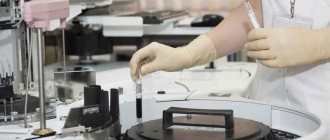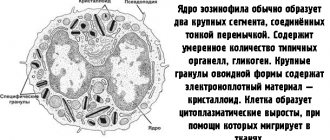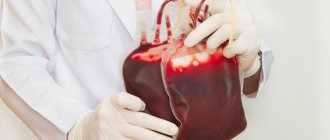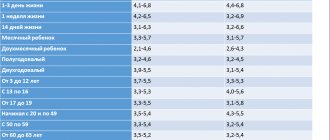This blood group was discovered later than others. The first three were discovered in 1900 by the Austrian Karl Landsteiner. Two years later, his students discovered that there was another group - a fourth.
The hitch occurred due to the fact that such blood is the rarest. The percentage of owners of this group on the planet is in the range of 4-6. Landsteiner simply did not come across material from this group during his experiments.
The fourth blood group is positive: characteristics of origin
Each group has its own historical roots. The first is considered the oldest, it traces its lineage back to ancient hunters. Then the second and third appeared. But AB arose on a historical scale relatively recently - no more than a thousand years ago. They call it a mystery. And that's why. No one knows exactly what resulted in the fourth (negative and positive) blood group. Three versions of its origin have been put forward.
- The most reliable assumption seems to be that it was formed as a result of interracial marriages. Since such families are not so common, the number of AB owners is small.
- The viral theory also looks interesting. According to her, previously people mainly suffered from microbial infections. But somewhere in the 15th-16th centuries, the massive spread of viruses began, and the fourth group became a kind of response to the viral invasion.
- The third hypothetical option connects its appearance with the transition of humanity to thermally processed food.
Peculiarities
Many owners of the fourth blood group already know that Jesus Christ had it, and will not fail to boast about it. But this is not necessary, because they are in fact generously endowed by nature with the best qualities. These are spiritualized natures, for whom the material world is of much less importance. They are endowed with an analytical mind, the ability to forecast, and various talents. When getting down to business, they show conscientiousness, pedantry, ingenuity, and always do everything professionally. Therefore, they are traditionally called “craftsmen,” that is, those who know their craft perfectly.
According to Eastern theories, representatives of the 4th group are called “mystery”. Despite their flexible and humane character, their caring and attentive attitude towards others, they remain completely undisclosed and always have their own opinion, which is difficult to refute. Characterized by very deep feelings and related experiences. They are typical romantics, often with their head in the clouds, and at the same time in everyday life they can show asceticism and practicality.
The disadvantages are indecision, underestimation of oneself, frequent doubts, soul-searching and excessive rethinking of what is happening, and often excessive gullibility.
During pregnancy, not only the Rh blood type plays an important role, but also its ABO group. A conflict may arise if the child inherits a blood type that is incompatible with the mother's blood type. Options for blood incompatibility should be taken into account when planning pregnancy.
Fourth blood group (Rh positive): features of inheritance
The specificity of inheritance is subject to the laws of another Austrian scientist - Gregor Mendel. Group 4 can occur if both parents have a total presence of antigens A and B.
An accurate forecast is impossible. There are special tables that describe the probabilities of conceiving a child with a particular group, depending on the group characteristics of the parents.
However, we are talking about probability. For example, even if the father and mother have both AB, this will not necessarily mean AB blood type; the child may receive A or B.
As for Rhesus, in most cases (approximately 75%) Rh+ is inherited, even if one of the parents is Rhesus negative. People with 4 negative group are about one percent of the total number of people.
Nutrition and diets
Despite the fact that the 4th blood group is quite rare among the entire population of the planet, the diet for such people is not refined. We will talk directly about the compatibility of products, and not about a special diet for weight loss. The nature of such warnings is that by eating properly there is no risk of excess weight, diseases of the digestive tract and other similar health problems. Therefore, it is worth highlighting exactly those food products that are ideal as a regular or periodic diet for blood group 4.
It is also worth noting that a moderately mixed diet is acceptable, where the nature of the diet is the compatibility of a little of all products. It is necessary to regularly eat turkey, rabbit or lamb meat. Equally important is fish, especially tuna, trout and sturgeon. As for cereals, you can include buckwheat, millet and rice in such a diet. To all this it is necessary to regularly add liver, various dairy products, namely cottage cheese, yogurt and kefir.
The diet should include vegetables, meat, fish and dairy products
It is not recommended to drink fresh whole milk too often. Nuts and olive oil are very useful for people with positive Rh blood group 4. A diet of this nature will be very useful and beneficial. After all, it contains all the necessary vitamins and microelements. Be sure to eat fruits and vegetables.
It is better to season all kinds of vegetable salads with olive oil, because such compatibility of ingredients is very useful. This is one of the few recommendations regarding diet for blood group 4. It is also worth noting which foods are not recommended to be included in this diet. These are corn and legumes, which provoke a slower production of insulin, and as a result of this, metabolism deteriorates and a person begins to gain weight. Such a system is present not only in this diet, but also in all others, because all prohibited foods cause excess weight in a person. This particularly applies to the nutritional pattern of the 4th blood group.
It is safe to say that such features have passed on from the second type of plasma and have now spread quite widely among all people. Pregnancy is no exception, when a woman begins to gain extra pounds. Most often this is associated with a change in its taste and the nature of perception of certain food products.
As for drinks, in this case the diet includes various fruit juices, linden tincture, black tea and some vegetable juices to taste. As for coffee, it is better not to overdo it, because in any case it causes side effects. And since the mucous membrane of the digestive tract is quite delicate, it can have an effect here too.
Thus, we can conclude that the nature of this diet is not too prohibitive. The main thing is that such a diet is not rare and provides for the compatibility of a fairly large number of products.
Blood type 4 is positive in children, women and men: what should be taken into account when transfusion
Karl Landsteiner's discoveries were important for the successful implementation of blood transfusions, since they help to avoid conflicts between the donor and recipient blood. Ignoring group and Rh compatibility during transfusion can end very badly for the recipient - coma and even death.
People with AB+ are in a relatively favorable position during blood transfusion. They are universal recipients because there are no antibodies in their blood. Blood of any type is suitable for them.
The only problem is that the donor is Rh negative. But there are much fewer people with Rh- than with Rh+. Usually donor blood is Rh positive. People with AB+ blood are bad donors. Their blood is suitable for transfusion only to recipients with the same group.
Transfusion
In the mass of the human body, blood connective fluid occupies approximately 1/14 of the share. If blood loss exceeds 1 liter, blood transfusion is prescribed. The blood transfusion procedure is necessary in the following situations:
- severe infectious diseases;
- burn lesions of large areas of skin;
- violation of osmotic pressure;
- blood cell deficiency;
- heavy blood loss;
- performing operations under conditions of artificial circulation.
The great advantage of patients with the fourth positive blood type is that carriers of all types can be donors for them. The same can be said about the fourth negative type; they are called universal recipients. In rare cases, blood cells of groups 1-3 may be incompatible with group 4 due to agglutination.
Before blood transfusion, a compatibility test is required. A biological test is a three-time injection of small doses of blood cells into the patient every 3 minutes. If there are no negative reactions, then the transfusion is acceptable.
At the same time, type AB blood can only be transfused to patients with the same type. This means that the introduction of blood of group 4 to people with group 1, 2 or 3 provokes a massive thickening of red blood cells.
Important information: How to find out your blood type and determine the Rh factor without tests at home
Donating a small volume of blood from a person (up to 250 ml) helps to activate the body’s hematopoietic system. By donating blood, a person helps not only other people, but also himself.
Fourth positive blood group: characteristics of predisposition to diseases
Researchers have long noticed that people with the same blood type suffer more often from some diseases and less often from others, and their immunity is of unequal strength. According to scientists, this is caused by the presence or absence of antigens A and B.
- People with 4+ are predisposed due to antigen A to the following diseases:
- Iron-deficiency anemia,
- pyoderma,
- Lyell's syndrome,
- eczema,
- hives,
- jaundice,
- salmonellosis,
- various aneurysms (protrusions of blood vessels),
- anacid gastritis.
- The presence of the B antigen makes them more vulnerable to the following diseases:
- systemic lupus erythematosus,
- systemic scleroderma,
- periarthritis nodosa,
- nuclear jaundice (severe complication of hemolytic disease of the newborn).
However, having a predisposition to a disease and getting sick are not the same thing. With a healthy lifestyle and a thoughtful diet, people in group 4 are able to live to an old age.
Diet
- When organizing proper nutrition, people with group 4 should take into account that in most cases they have low stomach acidity. Hence the conclusion - it is worth limiting the consumption of meat and meat products, since with low acidity they are poorly digested.
- To avoid anemia, sea fish is useful.
- Low-fat fermented milk products are beneficial.
- Sea kale improves metabolism.
- Beans and corn are not the best choices. They can negatively affect the pancreas.
- If the diet is aimed at losing weight, it is not recommended to eat buckwheat and wheat porridge. They contribute to excess weight gain.
ethnoscience
To improve health and treat certain diseases, people with 4+ are suitable for:
- large-rooted alocasia,
- marshmallow,
- hawthorn,
- black elderberry,
- valerian,
- oak bark,
- Chinese ginseng,
- figs,
- birch,
- white acacia,
- cowberry,
- burdock,
- fern,
- plantain,
- chamomile,
- Rowan,
- lilac.
Health
The character traits of persons with the fourth positive blood group leave an imprint on health. Excessive worries lead to diseases of the circulatory and digestive organs, and hard work and diligence lead to overwork, diseases of the motor system, and exhaustion of the nervous system. Low immunity is characteristic, hence frequent colds that turn into chronic diseases - sinusitis, bronchitis, pneumonia.
Insufficient attention to the way you eat leads to disorders of the digestive organs - peptic ulcers, chronic constipation, colitis. Frequent overwork and a general decrease in immunity create a background for the development of blood diseases and tumors, including malignant ones.
A feature of “artisan” people is their weakened attention to their health, which, on the one hand, can lead to advanced diseases, but, on the other hand, allows them not to be fixated on their condition, switch to business and feel satisfactory.
Solving the problem in the presence of blood conflict
Modern medicine offers several essentially different options for maintaining pregnancy in case of incompatibility of any type. Timely examination at the planning stage and regular visits to the doctor managing the pregnancy can minimize the risks of complications.
Plasmapheresis
The procedure for purifying maternal blood plasma from antibodies and its possible replacement with sterile or vitamin solutions. Plasmapheresis is carried out at different stages:
- When planning pregnancy to cleanse the body of toxins and antibodies;
- In the initial detection of Rh conflict, when replacing about 30% of the plasma with saline or albumin solution makes the development of the embryo safe;
- With a sharp increase in the level of antibodies in the mother’s blood, diagnosed at any stage of pregnancy.
Blood transfusion
It is the process of blood transfusion to a fetus inside the womb for a period of 22 weeks. In this case, blood is taken of the same type as that of the child, and must be Rh negative. The procedure is performed through the umbilical vein under ultrasound guidance and is designed to stop the baby from being rejected by the mother's immune system.
The main indications for transfusion are:
- Polyhydramnios;
- Detection of fluid in the child on an ultrasound of the abdominal cavity or an increased size of the liver;
- Thickening of the placenta;
- Change in the diameter of the umbilical veins.
Induction of labor
If, when a blood conflict is detected, the number of antibodies is low, then preference is given to natural childbirth. Induction of labor or prescribing a cesarean section requires constant medical supervision during hospitalization. The amount of antigens is measured twice a day, and if the level is significantly higher than normal, labor is induced immediately. In this case, treatment of a newborn from the possible consequences of a conflict with maternal blood is carried out after birth.
Is pregnancy possible?
Blood type 4 with a negative factor and pregnancy are quite compatible things, contrary to popular belief. However, in medicine there are known cases of incompatibility with a spouse or with one’s own child. If there is incompatibility with dad, then this is not too terrible a phenomenon compared to intrauterine conflict.
When a problem of incompatibility between parents arises, the doctor asks for additional tests and prescribes special examinations that make it possible to prevent future problems.
For a baby, a situation with a Rh mismatch is more dangerous. At 28 weeks of gestation, the doctor must inject the mother with immunoglobulin in order to overcome the antibodies and prevent them from entering the newborn’s blood. Otherwise, a Rhesus conflict will develop. A child whose blood contains maternal fluid that does not correspond to Rh will develop severe anemia and jaundice, and may fall into a coma inside the womb.
It is worth saying that the first pregnancy in women with such incompatibility occurs with the lowest risks. And if a woman becomes pregnant again or after an abortion, then the risk of developing a Rhesus conflict increases significantly, which negatively affects the child. Therefore, doctors strongly recommend that couples where the woman has a fourth negative blood group give birth to only one child from the first conception.
If the first pregnancy was successful, this does not mean that the next one will end the same. After all, a child does not inherit maternal negative blood in every case. He can also receive his father's Rh positive genes.


